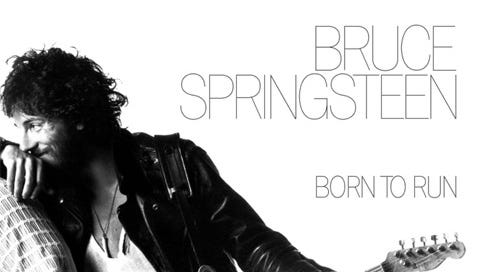They'll meet 'neath that giant Exxon sign that brings this fair city light
Bruce Springsteen - 'Jungleland' (Born To Run -1975)
Bruce Springsteen’s blockbuster 1975 album that launched his career into the stratosphere, Born To Run, climaxes with almost ten minutes of epic closer, Magnum Opus and anthem - ‘Jungleland’. Some people know the length of time the title track took to record, an epic six months, but ‘Jungleland’ took longer. In the same way that the final track is longer than any other song on the album, it also took the longest to record.
The first rehearsal was in early 1974, 19 months before it was completed. Six months into the album’s recording, the song was played live at a gig in New York. At this embryonic stage, the song wasn’t dissimilar to the potted, jazzy vignettes you would find on The Wild, The Innocent and The E Street Shuffle, Springsteen’s previous album. That would change as summer 1974 drifted on; Ernest Carter and David Sancious would leave the band, and in came Max Weinberg and Roy Bittan alongside Suki Lahav, wife of studio engineer Louis Lahav, a violinist whose 23-note prelude intros the final version of ‘Jungleland’.
The song continued to be refined over the next year, both in the studio and live - where Setlist.fm suggests it was played almost 40 times before the album’s eventual release. This saw the song become less jazzy, and by the summer of 1975, the song had different lyrics, vocals and guitar tracks compared to the version from the previous summer. An experiment with a Spanish-infused Flamenco guitar intro fell by the wayside.
At this point, with the tour promoting the album imminent, Clarence Clemons was trying to land the song’s epic, three-minute-long sax solo. He eventually spent sixteen hours playing over and over again every note until he knew it forwards, backwards and sideways to satisfy The Boss. Those sixteen hours were worth it, it is hard to think of a better saxophone solo in popular music, and it has the soul and swagger to lift the whole song. There was also a late swerve to maintain the grit of the song and not have strings, as Springsteen decided that took away some of the darkness on the edge of the track.
In his 2016 autobiography, Springsteen said that.
From there it's all night, the city and the spiritual battleground of "Jungleland" as the band works its way through musical movement after musical movement. Then, Clarence's greatest recorded moment. That solo. One last musical ebb, and . . . "The poets down here don’t write nothing at all, they just stand back and let it all be . . . ," the knife-in-the-back wail of my vocal outro, the last sound you hear, finishes it all in bloody operatic glory. At record's end, our lovers from ‘Thunder Road’ have had their early hard-won optimism severely tested by the streets of my noir city.
The song has that micro rock opera feel, like the end of ‘She’s The One’ and the piano that wouldn’t have sounded out of place on Tommy or Quadrophenia by The Who. We have the different lead instruments; violin, piano, guitar and saxophone, as we move through the tale of the doomed blue-collar Jersey lovers, “Magic Rat” and “Barefoot girl”. Like many of the closers we have discussed here, the song pulls together themes of the album brought together in an almost novella-like cast of characters and imagery that rolls out like a mid-Sixties Bob Dylan epic.
.As Springsteen says above, ‘Thunder Road’’ and its optimism has evaporated like car exhaust into the night. By the song’s end, desperation becomes despair as “Magic Rat” is killed. The love affair, described and visualised as well as the world we see in American Graffiti, West Side Story or Happy Days, has the colour drained from it, and we are left with Springsteen’s wordless wailing at the end of the song. Melissa Etheridge has described that sound, that force, emotion and passion as the definition of rock and roll - his whole body poured into pronouncing a feeling without language.
After the album was released, the song was played towards the end of shows, as you would expect. By the turn of the century, it would appear in a revolving epic section of the band’s reunion tour, sometimes with ‘Meeting Across The River’ preceding as on the parent album. It would wax and wane out of the setlist for the next few years. Still, after Clemons died in 2011, the song didn’t appear in the first half of the 2012 Wrecking Ball tour until a show in Gothenburg where Clemons’ nephew Jake Clemons took up his spot on the stage and delivered an emotionally charged version of the song.
After this, it appeared more regularly, and the song is one of Springsteen’s most twenty played songs, acknowledged as one of his best songs1 and one of the best epic album closers you are likely to hear.
It finished #13 in a Rolling Stone poll of his greatest songs but still was supplanted by three songs from Born To Run.





Have to admit upfront to a Bruce Springsteen Blind Spot but ...
... I gave 'Jungleland' another try. I'll grudgingly admit to liking some bits of it, but surely 'overblown' eventually comes to mind, wouldn't a snappier 6min version be better?
An amazing song on a record chock-full of them!